Prof. Dr. Kerem Öktem (Ca’ Foscari University of Venice, Political Science and International Relations)
Concrete Empire: Turkey’s Cultural-Religious Foreign Policy in Southeast Europe
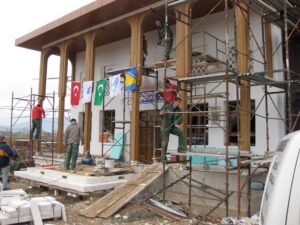
Construction of the Campus Mosque of the International University of Sarajevo in the Ilidža (photo by the author, April 2010)
The restoration of Ottoman monuments and the construction of representative grand mosques, often in a historicizing Ottoman-Seljuk style and on an impressive scale, has now long been a central component of Turkey’s cultural-religious foreign policy on a global scale. In Southeast Europe, several representative grand mosques are being built by Turkish contractors in Albania, North Macedonia, Kosovo, and Cyprus. These projects not only compete with the construction of churches by Catholic and Orthodox communities but occasionally also with initiatives from other Islamic countries and organizations. The research project “Concrete Empire” examines the implementation and reception of Turkey’s recent foreign policy in the Balkans, with a particular focus on the construction and restoration of these religious infrastructures. Within the framework of “Concrete Empire” –where the term “concrete” stands both for the building material concrete, used generously in these grand projects, and for “concrete” in the sense of a “concretization of imperial ideas”– I engage with the actors of this foreign policy and their interpretations regarding these religious architectural structures. The central question is to what extent the presence of representative mosques in Ottoman-Seljuk style establishes connections of meaning between Turkey and the Balkans, as well as between the post-socialist present and the Ottoman past. These connections seem to render the Balkan space more readable for the actors of Turkish foreign policy. I am particularly interested in understanding how affective spatiotemporal continuities emerge, leading to a blurring of existing national and contextual boundaries in the perception especially of Turkish actors. In the context of debates about Turkey as a “neo-Ottoman” or “neo-imperial” power, I am also interested in the reception of this foreign policy perspective in the aforementioned countries. The question arises as to whether and among which actors this foreign policy resonates and how it influences existing conflict lines and experiences of exclusion, especially within the Muslim communities in the region. Finally, I seek to show how the case study of mosque-building in the Balkans demonstrates the extent to which, in the last two decades, Turkish foreign policy has taken on a more religiously orientated, and more imperially-minded form.
Dr. Sena Hatip Dinçyürek
The European Recipients of the Order of Mercy (Şefkat Nişânı), A Study of Prosopography
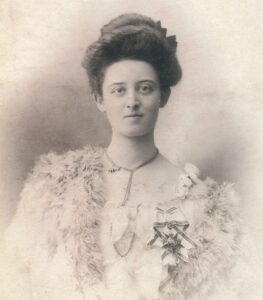
Portrait of a woman wearing the Order of Mercy (Edhem Eldem, İftihar ve İmtiyaz, İstanbul, 2004)
The Order of Mercy (Şefkat Nişanı, the Order of Chefakat) was the first Ottoman imperial order instituted specifically for women by Sultan Abdülhamid II in 1878. It was originally created to honour women for their charitable work and services in the Ottoman Empire. The very first Order of Mercy was given to the wife of the British ambassador, Lady Enid Layard, in 1878; as a recognition of her relief efforts for Ottoman war refugees. However, soon after, this imperial order was conferred mainly to prominent European women – along with Ottoman ladies –for their charitable services in the empire or in recognition of their status in the society or in the diplomatic circles.
Today, even cursory research in the Ottoman Archives provides us with a number of names and records of European ladies who were bestowed with the Şefkat Nişanı. They form the primary focus of this project. This includes female relatives of members of the diplomatic corps serving in Ottoman lands, prominent members of the European community who lived in Turkey or temporarily visited the country, but also some without any personal connection to the Ottoman Empire who were deemed important enough to be given a decoration by the Sultan. Apparently, these ladies played a significant role in the European-Ottoman relations in the late nineteenth and early twentieth centuries. Hence, the project takes a prosopographical approach to their individual stories in order to reveal their potentially existing connections with each other, and their role both in the Ottoman and their native societies. These foreign ladies were in any way part of late Ottoman History; compiling their collective biography with a special emphasis on their bestowment with the Order of Mercy will contribute to the diplomatic and social histories of the countriesinvolved .
Gülay Yılmaz, Associate Professor (Akdeniz Üniversity, Department of History)
The Devshirme System of the Ottoman Empire, 1450-1650
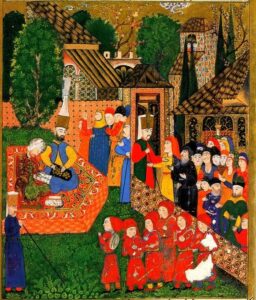
Devshirme recruitment, Arifi, Süleymanname, Topkapı Sarayı Müzesi, H. 1517.
The goal of this project is to produce an authoritative scholarly monograph on the devshirme, a system of slavery that was crucial to the formation of the Ottoman Empire, yet remains insufficiently understood. For centuries, the Ottomans levied children from the Christian population of the Empire. These children were converted to Islam, educated and taught Turkish, and eventually placed in administrative and military posts. Accounts of the devshirme institution by Ottoman historians have focused predominantly on Ottoman statesmen of devshirme origin, or the most famous “end product” of the slavery regime, the janissary army. Instead, the current project will shift the attention to imperial politics of recruitment, its connection with the ruling methods in the Balkans, and to the children and youth caught up in these politics. It will examine the agency of these overlooked historical actors, analyze the embodied experiences of this institution of slavery as both an Ottoman phenomenon and as part of contemporary global forced labor regimes. This project will employ underutilized archival records, such as the unique levy register of 1603-4, salary registers, narrative sources, as well as miniatures to provide a critical account of the devshirme system from the mid-fifteenth century up to its demise in the mid-seventeenth century.
Simone Salmon, PhD Candidate in Ethnomusicology (University of California, Los Angeles)
Yaşa! Diversity, Place, and Memory in Turkish Jewish Music
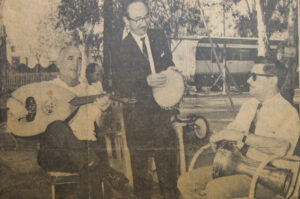
Clipping from an unidentified newspaper with Isaac Sene in the year 1972 from one of the many “Turktown” Sephardic picnics that took place at Ladera Park in Los Angeles.
Simone Salmon’s dissertation explores the state of Jewish music amid a climate of Turkish ethnonationalism that leaves Jews envisioning modern Spain as a new homeland to invoke their imagined memory of ancient Sefarad. She compares the Turkish experience to the experience of members of the Los Angeles Turkish-Jewish diaspora that look not only to ancient Spain but also to the Ottoman Empire as their homelands.
Istanbul Jews navigate a porous divide between tacitly supporting the reigning party and voting swiftly against it. The Chief Rabbinate cooperates with Turkish officials of the Justice and Development Party (AKP), while Istanbul’s Jewish museum boasts gratitude to the country for giving its Jews a safe homeland. With antisemitism increasing, this tension is compounded by most public-facing Jewish events relying on government funding to show pride for the country’s “colorful cultural mosaic”. This precarity has left some local Jewish musicians looking to Spain as a new homeland to replace what increasingly feels like a host country while immigrating Jewish musicians look to Istanbul as a hostland to escape the horrors of the Russia-Ukraine war.
For Turkish-born Sephardim and the Los Angeles diaspora, this replacement is restorative—a return to Sefarad—reflected in opposed musical styles among the Istanbul and Los Angeles counterparts that illustrate the ambiguity of their identities as Western or Eastern and ancient or modern people. In addition, access to a Spanish passport provides Turkish Jews the tools to escape an economic crisis that worsens at near-exponential rates. This dissertation considers the implications of music-making by members of Turkey’s minority population at a time when national belonging is contingent not on legal citizenship but upon the eye of the beholder while investigating the powerful pull of nostalgia that relies on music to bend the barriers of time, space, and collective memory for Jews in Turkey and the United States.
Audrey Wozniak, M.A. (Harvard University)
A Discipline for the Nation: Turkish Classical Music Choirs in History and Practice
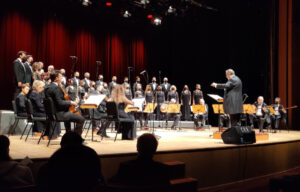
Cumhurbaşkanlığı Klasik Türk Müziği Korosu (Presidential Classical Turkish Music Chorus) Concert, Istanbul, November 2021. Photographer: Audrey Wozniak.
My research project is concerned with an extraordinary but overlooked musical phenomenon in Turkish classical music that emerged in tandem with the establishment of the Turkish Republic by Mustafa Kemal Ataturk in 1923: the formation of many state-run and amateur choirs throughout the new Republic, which also entailed a fundamental shift in the musical genre and performance practice. My central argument is that seemingly extramusical social and political during the decline of the Ottoman Empire and in the burgeoning Turkish Republic were reflected in these emerging Turkish classical music choirs, which prove to be valuable sociocultural microcosms within which anxieties and contentions over (individual and national) identity play out in rehearsal and performance practices.
Using ethnographic and archival research methods, my work traces the historical phenomenon of the choir as an ensemble format in Turkish classical music over the course of the last century as well its widespread present manifestations in Turkish and diasporic urban contexts. My project is the first to center Turkish classical music choirs as sites in which contestations of “Turkishness” and concerns about political, cultural, social values continue to be performed. I aim for my work of documenting the cultural and political significance of Turkish classical music to have long-term national and international impacts by demonstrating how a manifestation of Turkish cultural heritage has meaning for Turkish citizens and Turks around the world.
